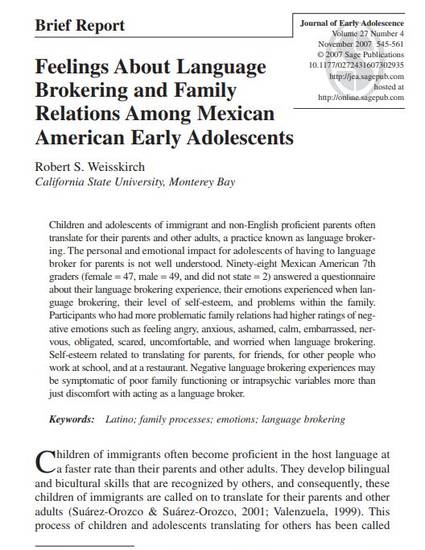
Article
Feelings About Language Brokering and Family Relations Among Mexican American Early Adolescents
Journal of Early Adolescence
(2007)
Abstract
Children and adolescents of immigrant and non-English proficient parents often translate for their parents and other adults, a practice known as language brokering. The personal and emotional impact for adolescents of having to language broker for parents is not well understood. Ninety-eight Mexican American 7th graders (female = 47, male = 49, and did not state = 2) answered a questionnaire about their language brokering experience, their emotions experienced when language brokering, their level of self-esteem, and problems within the family. Participants who had more problematic family relations had higher ratings of negative emotions such as feeling angry, anxious, ashamed, calm, embarrassed, nervous, obligated, scared, uncomfortable, and worried when language brokering. Self-esteem related to translating for parents, for friends, for other people who work at school, and at a restaurant. Negative language brokering experiences may be symptomatic of poor family functioning or intrapsychic variables more than just discomfort with acting as a language broker.
Keywords
- Latino,
- family processes,
- emotions,
- language brokering
Disciplines
Publication Date
2007
DOI
10.1177/0272431607302935
Citation Information
Robert S. Weisskirch. "Feelings About Language Brokering and Family Relations Among Mexican American Early Adolescents" Journal of Early Adolescence Vol. 27 Iss. 4 (2007) p. 545 - 561 Available at: http://works.bepress.com/rob-weisskirch/34/
